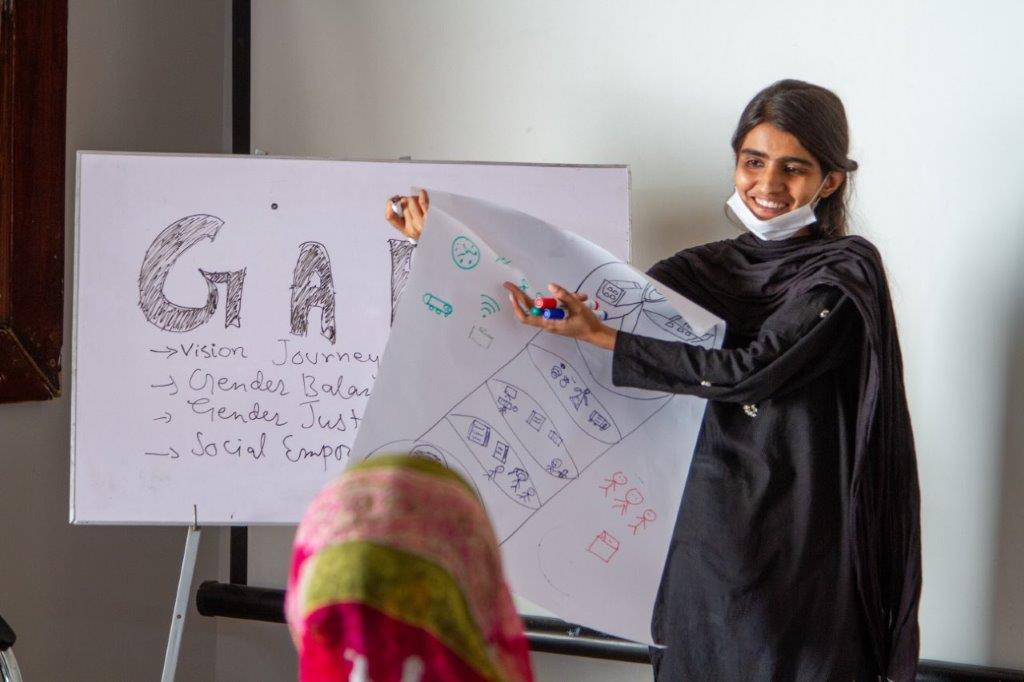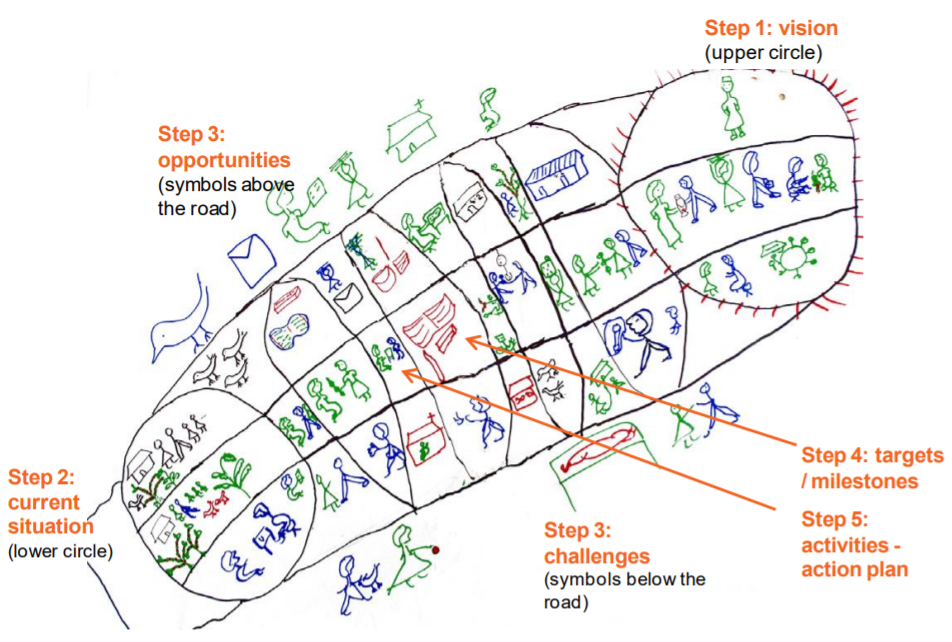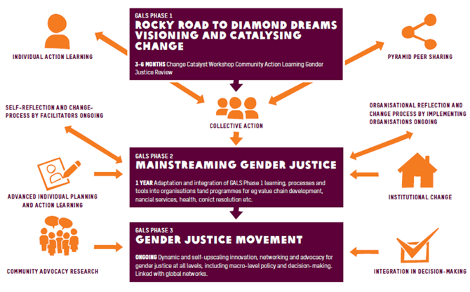Gender Action Learning System (GALS) in Pakistan and Indonesia
The Gender Action Learning System (GALS) is a community-led methodology developed by Oxfam for livelihoods improvement and gender justice. It uses visual diagramming tools, principles and peer learning mechanisms that enable marginalized people to develop their own visions of where they want to go. Participants are encouraged to reflect on their situation, map markets and relationships, identify challenges, and take action to address these. Within EYW, GALS has been used in Indonesia and Pakistan to develop youth agency and strive for gender justice.
How is GALS used in EYW?
GALS is a structured methodology for empowerment aiming at economic, social and political transformation. It gives women and men more control over their lives and catalyzes a movement towards gender justice. GALS includes a variety of visual tools, including road journeys, trees and circle maps to enable individuals and households to plan and track changes in their lives, gender relations and livelihoods, as well as identify and negotiate their needs and interests with power-holders.
The tools are also used by cooperatives and other actors like business owners and service providers to change gender and power relations that constrain them from achieving their visions. GALS also provides a structured process for multi-stakeholder negotiation for gender equality, better livelihoods, and improved local economies and value chains.
The main trainers are community members themselves. Within EYW, GALS has been used in Indonesia and Pakistan to:
- Strengthening the agency of youth (especially young women), with a particular focus on aspirations, influencing household decision-making, rights awareness, self-esteem, group membership and leadership skills;
- Changing gender and power relations so that youth (especially young women) can access and benefit from (self-)employment opportunities;
- Making violence against women and girls, discrimination, and the economic, social and political exclusion of women unacceptable in different cultural settings;
- Mobilizing youth, their families and communities to change deep-rooted social norms and behavior
In Pakistan, the tools most appreciated by youth include the Local Area Development Map, used to analyze stakeholders influencing the development of the community; the Vision Road Journey, giving the possibility to make plans regarding their future and the possibility to have an income; and the Challenge Action Tree, increasing young people’s analytical skills.

Kaainat (25), explaining GALS at the Innovation Hub in Jamshoro. Read her story
Methodology
GALS was developed under Oxfam Novib’s WEMAN program with academic Linda Mayoux and local civil society partners in Uganda, Sudan, Peru and India. It consists of:
- A set of principles related to gender justice, participation and leadership;
- A series of visual diagramming tools that are used for visioning, analysis, change planning and tracking by individuals, households, stakeholder groups or in multi-stakeholder settings
- Peer learning mechanisms and structures for ongoing action learning in communities
- Mechanisms to sustainably integrate GALS in organizations or interventions such as financial services, business development services and agricultural extension.

Example of the 'Multilane Highway Journey' tool
GALS is designed as a complementary methodology for economic development interventions. The starting point is:
- Developing gender action learning skills of vulnerable stakeholder groups in the value chain, to enable them to identify and implement sustainable strategies to increase incomes, resources, economic choices and negotiation power.
- Engaging skills, energies and resources of the private sector and institutional stakeholders in the value chain to change power and gender relations, through the negotiation of win-win strategies. It starts with creating community ownership and action priorities for gender justice during events with community members and the staff of organizations.
Three phases have been identified in the GALS methodology, based on lessons learned from applying GALS in different contexts. In reality, these three phases can overlap. GALS can be used for:
Phase 1: Envisioning and catalysing change, linking individuals, families and collective action. In this initial phase, the focus is mainly on increasing the agency and self-esteem of community members and setting up peer-sharing structures.
Phase 2: Mainstreaming gender justice in programmes, projects, interventions and organisations to bring about institutional change; strengthening negotiation skills of community members to engage with more powerful actors in the (local) economic/political field; and strengthening local networks.
Phase 3: Developing a gender justice movement: bringing local networks into national ones, and linking the national networks to the global ones.

Results gained from Pakistan and Indonesia
- In Pakistan, a total of 4009 youth (2908 women) participated in the GALS sessions. In Indonesia, a total of 523 youth (285 women) benefited from GALS.
- The EYW Innovation Hubs served as important safe spaces for young people to engage in GALS. Young people appreciate having a space away from their families and communities where they can get together, discuss, plan, and implement their ideas.
- Through GALS, youth in Pakistan are becoming more interest in social issues and start to work on coming up with solutions.
- Additionally, young girls have started to discuss and motivate their parents and other community elders to allow them to work. Several of them are already engaging in work.
- However, community norms can be very rigid, and it takes time to change perception regarding practices such as sharing unpaid care work.
- To have a bigger impact in communities, other youth should be targeted and engaged in GALS beyond the young people already engaged with the Hubs.
- Both Pakistani and Indonesian youth state that through GALS they have learned to create a vision for the future, set goals accordingly, and to devise and implement a plan to achieve these goals. This is a result of a specific set of tools in GALS, known as ‘road journeys’.
- The young people who participated in the GALS activities stated that they feel more confident in general. This again helped them to achieve the goals which they had set for themselves. Also, they felt more comfortable interacting with their peers, families and speaking in public. Some even replicated the tools and processes of GALS within their community, which encouraged their leadership skills.
- Especially young women became more aware of the rights which they hold. They state that before the trainings, they generally held more traditional/regressive views about the status of women in society and their role in the household. Through the awareness which they gained, they were able to recognize and address the challenges and barriers which they face as women in profoundly patriarchal communities. Some young women faced barriers formed by their family members to engage in higher education or economic activities, but learned how to address this challenge by putting their knowledge of rights, confidence, negotiation and problem-solving skills to use.
- Young women who benefitted from the GALS sessions, tried to replicate the trainings among their friends and community, seeing themselves being a role model to others.
- Men also changed their views more positively towards women after participating in GALS sessions. They started helping their women in the household and a positive change in gender based violence was observed.
- Several young women and men stated that prior to GALS, they lacked the confidence to pursue the economic activity of their choice. After visioning their future and setting goals, young people gained more confidence, motivation and knowledge on how to negotiate with others.
Lessons and Challenges
- The community has its own perception which can be very rigid towards their existing norms, so it will take time to change their perception regarding unpaid care work/share care work.
- It has been observed that through GALS youth are getting more interested in social issues and started working on their own solutions.
- It has been also observed that women and girls have started to discuss and motivate their elders and parents to allow them to work and few of them are in employment.
- GALS is a complete project in itself. It should be implemented as a separate entity and engage youth (not innovators) from other communities apart from project intervention communities.
- The different methodologies and tools are very useful, but they should be integrated into projects from the beginning. For example in the EYW projects the GALS frameworks should be more integrated and mainstreamed with the project and its activities since they have overlapping designs (e.g. Humans Centered Design) which could strengthen each other Different methodologies and tools are very useful but should be integrated together from the beginning on. The GALS framework should be more integrated and mainstreamed within a program such as EYW and its activities, as they can strengthen each other and prevent overlap. E.g., Human- Centered Design in EYW could be combined with the GALS phases to enhance stakeholder participation.
- More follow-up meetings were needed (each week) to keep the spirit up. Especially short group meetings were seen to be valuable and extra enjoyable to young people, as they enjoy working in groups.
- Many youths were Muslim, which were strongly influenced by their environment, often not having their own personal vision. Especially women, who were focused on marriage. It was seen that this strong cultural and religious influence made it hard for some youth to maintain their motivation. This was discussed through using the tools (e.g., identity diamond), making them aware about these boundaries and the solutions.
- Young people could benefit from a GALS guidance book, where they could do their exercises in. Sometimes they lose their materials and forget about what they drew.
- The delay due to COVID and lack of human interaction formed a big challenge and had a negative impact on the motivation of youth. However, when physical meetings started again, young people really wanted to meet up again. Especially as at this moment phase 2 was integrated, which really matched with their needs at that moment (i.e., economic activities).
- Young people appreciate having a space destined for their meetings, away from their families and the rest of the community where they can get together, discuss, plan and implement their ideas. The following are some practicalities for finding this space: Should be far away from parents so young people can feel safe to share and meet. Sometimes local governments or community leaders can help provide an empty space for young people to meet. Within the EYW project, the hubs were used for facilitating the GALS sessions.
- The way in which GALS benefits youth in regard to creating economic opportunities differs for men and women. For men, the tools and activities helped them with the ‘how’ of the process – defining the vision and goals, and acquiring or strengthening the skills and confidence needed to achieve them. For young women, on the other hand, the economic empowerment journey required going back a few steps, i.e. starting from whether women can participate in an economic activity. Here, knowledge of women’s rights and the prevailing gender norms that deter them from being economically independent were critical. The first step for young women, therefore, was to recognise and believe that they have the same right as men to participate in economic activities.
- It is important to also include men/husbands in the sessions of GALS, as they can become part of the solution of certain barriers which are existing for women.
- When parents are sensitized on the fact that their daughters are treated well on the work floor and will gain income, they will be more likely to give them permission to engage in income generating activities outside of the house
- GALS is a fun way of learning. This aspect lets young people participate and enjoy a lot. If some harsh discussions take place the fun moments (music during drawing, refreshers) help in calming down the discussions and taking them towards objectives of GALS.
Sustainability and scaling
The impact which has been created through GALS can be seen as sustainable, as it helped young people to build their mental strength and motivation, especially that of young women. The inclusion of family and community members creates a strong basis for sustaining the effects. The fact that young participants also share their experiences and lessons with peers and community members, becoming role models, shows the importance of the GALS methodology and that it can be sustained. It is important to integrate GALS methodologies in empowerment programs, as sustainable progress cannot be made without addressing the key drivers like inequality and gender.
In Pakistan, the team is currently creating video tutorials that are meant as refresher trainings for those who had previously been trained in GALS. However, they are not meant to train new community members as it is difficult to facilitate an empowering process through a video. These video tutorials will be prepared by GALS champions with support from Oxfam Pakistan, their partner organizations, and a video maker. This activity is an adaptation to the limited fieldwork during COVID-19. In this way, previous knowledge will not get lost and GALS champions can keep on training their peers and receive support at distance. Facilitation principles will be applied in the videos themselves, with one video focused specifically on facilitation skills.
